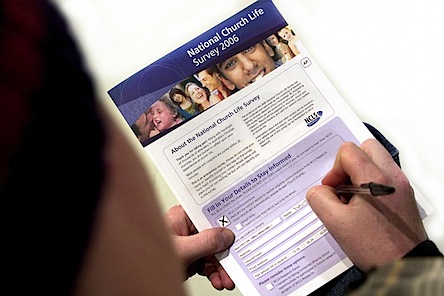Will the National Church LIfe Survey help us confront the brutal facts?
 Jim Collins said, the difference between Good and Great is how you confront the brutal facts. You can't confront them if you don't know them.
Jim Collins said, the difference between Good and Great is how you confront the brutal facts. You can't confront them if you don't know them.
Every five years the National Church Life Survey (NCLS) conducts a survey into church life and mission in Australia. Previously they have done some great work tracking the effectiveness of church planting.
The latest NCLS findings are due out soon. I'll read them with interest.
Here's my wish list for the NCLS or any research into church life and mission health and progress:
1. Generational growth
Most surveys focus on single local churches. Are they growing or declining? What's the age range of attenders? Who has come to faith?
Mildly interesting stuff.
What would get me on the edge of my seat are some questions like these:
Has this church started a new church in the last twelve months?
Have any of the new churches started new churches?
I'm not concerned if the church has a membership of five for five thousand—I want to know where are the churches with children, grand children and great grandchildren. Show me some four generation churches and I'll be happy.
2. Variations within the same denominations
The NCLS provides figures on the various denominations—Anglican, Baptist, Uniting etc. They tell us something, but not a lot.
Show me the difference in vitality and growth between say the Sydney Anglicans, who are evangelicals, and the Perth Anglicans who are not. Are the Sydney Anglicans multiplying churches or just planting them? Why?
Let's compare the evangelical St Matthew's Anglican church with the rest of the Perth diocese. What's the difference and why?
What about the Baptists in NSW who are evangelical, who have a strategy to plant churches, and have committed good leaders to pursue it? Let's compare their progress with say, the Baptists in Victoria, my home state.
A few years ago the BUV had just two churches that had planted churches in the previous five years, Crossway, my home church and Lilydale Baptist, which has fallen on hard times.
These variations have more to do with orthodoxy of belief and effectiveness of practice rather than geography.
3. The ratio that counts
I'd like to know what the ratio of churches is to the growing Australian population.
In 1991, using NCLS figures, I estimated it was one church to very 1561 people. In 2001 it was one to every 1800 people. I've not been able to get the figures from the NCLS for 2006, I suspect was around one to 2000 people. Where are we now?
Church leaders in Australia are flying blind on one of the most important indicators of progress in our mission.
4. The Pentecostals
Since 1977 the Australian Christian Churches have been one of the fastest growing movements in the land.
Two years ago I suggested the rate of ACC growth may be slowing. The ACC has been moving to a model of consolidation around successful multisite churches, rather than continuing an aggressive church planting strategy.
I'd like to be wrong, but since my prediction ACC figures have become hard to come by. That normally points to a plateau or decline.
5. The emerging-missional communities
For years we've had the critique. We've had the claims that, while the existing church can only reach 9% of the population in Australia, the emerging-missional communities are going after the 91%.
So how are they doing? Are they seeing new disciples, new groups forming, new churches started of any shape or form? Are they multiplying disciples and communities? Or are they lost in a missional fog? Show me the people.
6. The exceptions
Will the survey show us the unexpected outcomes—good or bad? What churches and denominations are collapsing?
I don't think the Uniting Church counts it's people any more. I don't think it wants to face just how bad things are.
What churches or movements are seeing unexpected progress. What new groups are out connecting with people, sharing the gospel, making disciples, and multiplying communities of Jesus' followers?
Perhaps I expect too much from the NCLS and participating churches. Then again, how carefully do you track your money? Do you know your financial status? Do you have a budget? Do warning bells ring and red lights flash when you're dangerously close of bankruptcy? So, if it's important to track financial key indicators, why not key indicators for the progress of the gospel?
